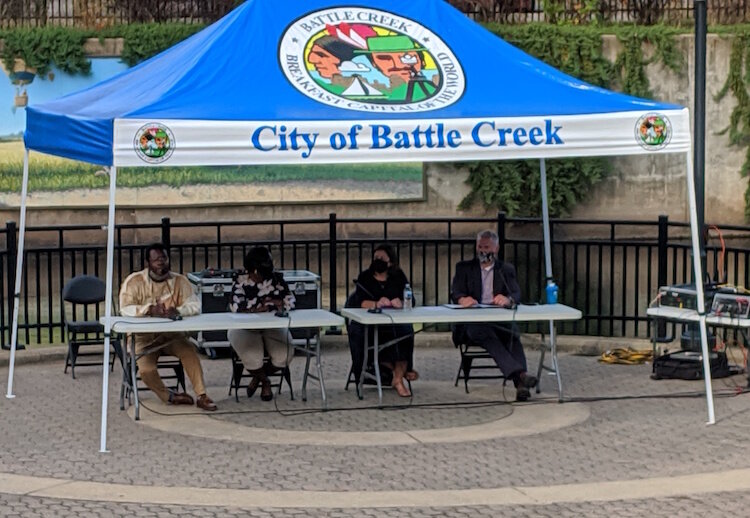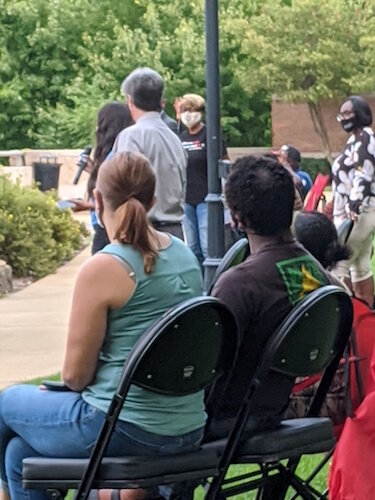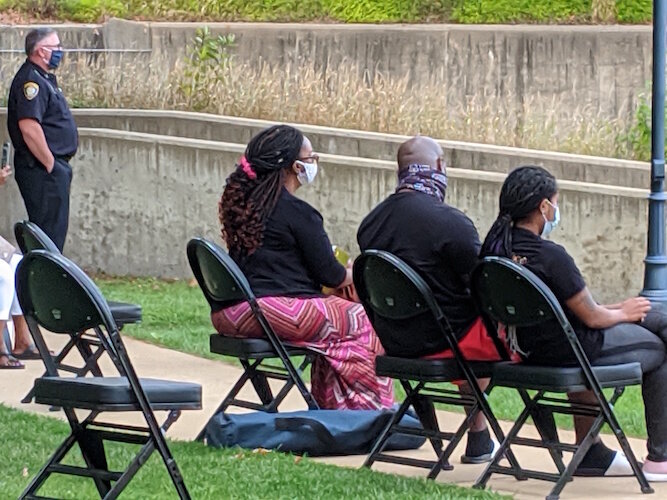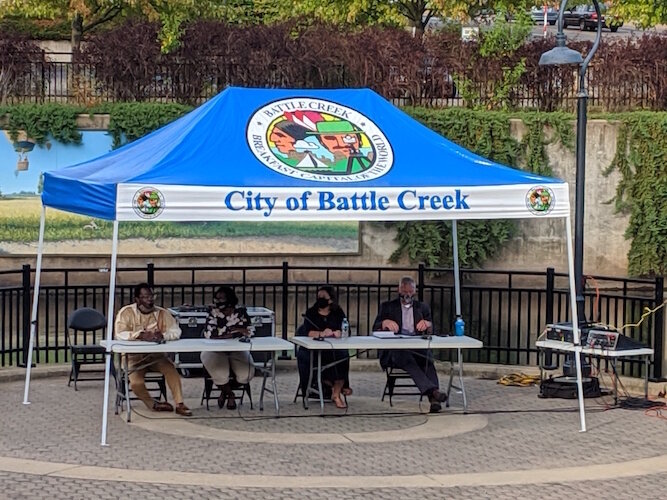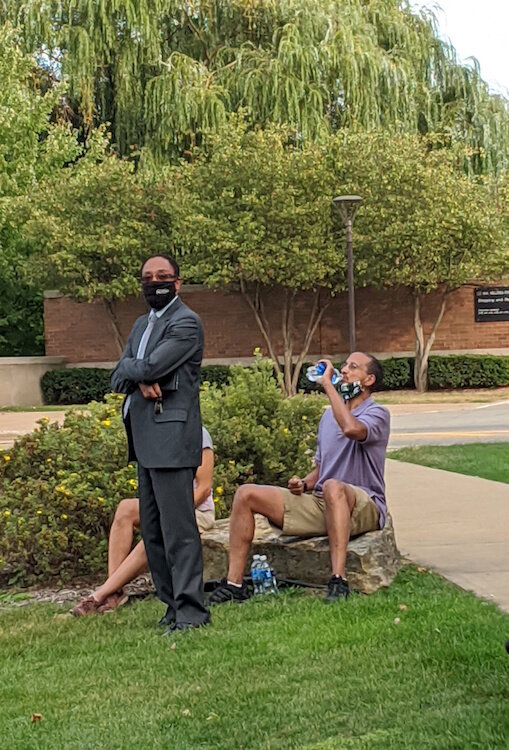‘Let’s Get Real’ series of conversations begins between Black community members and B.C. officials
Some conversations need to be shared. Leaders of Battle Creek's Black community brought together city officials to share concerns and aspirations.
Editor’s note: This story is part of Southwest Michigan Second Wave’s On the Ground Battle Creek series.
The coronavirus pandemic and the ongoing civil unrest sparked by the murder of George Floyd dealt a one-two punch to the nation’s Black residents, including those who call Battle Creek home.
On Monday evening (Aug. 31) more than 40 members and leaders of the city’s Black community came together at Friendship Park to share with city officials and representatives of the United Way of Battle Creek Kalamazoo Region concerns, expectations and hopes for their futures that they have been talking about in separate conversations among individual groups.
Attendees wearing masks sat in black padded chairs spaced to maintain social distancing guidelines on a grassy slope facing panel members, including City Manager Rebecca Fleury and Police Chief Jim Blocker, who were seated under an awning. The gathering was the first in the “Let’s Get Real Series” of conversations sponsored by the Southwestern Michigan Urban League, the African American Collaborative, and the City of Battle Creek.
L.E. Johnson, with the Urban League and African American Collaborative, says there are a number of issues that have impacted the African American community differently and drastically. A higher unemployment rate and lack of access to quality, affordable healthcare are among them. He says the disproportionately high number of African Americans impacted by the pandemic put a much clearer focus on the disparities.
“We know that the death of George Floyd and others packed a lot of tension and concerns. We had a protest vigil and the planting of a racial healing garden,” Johnson says. “We found ourselves having solo and sidebar conversations here and there and we thought if we could bring those conversations to our city leadership, we could put all of our cards and concerns on the table so we could really work towards solutions that would address our concerns.”
Many of those who spoke were candidates running to represent different wards on the City Commission, in addition to the Mayor’s seat. This year’s slate of candidates represents a record number of Blacks seeking elected office, according to the Calhoun County Clerk’s office.
Jerry Steiner, who is running for Mayor, says when he moved back to Battle Creek 12 years ago, he saw a lot of things that concerned him, among them that the Black community-at-large was not a part of the city’s political apparatus.
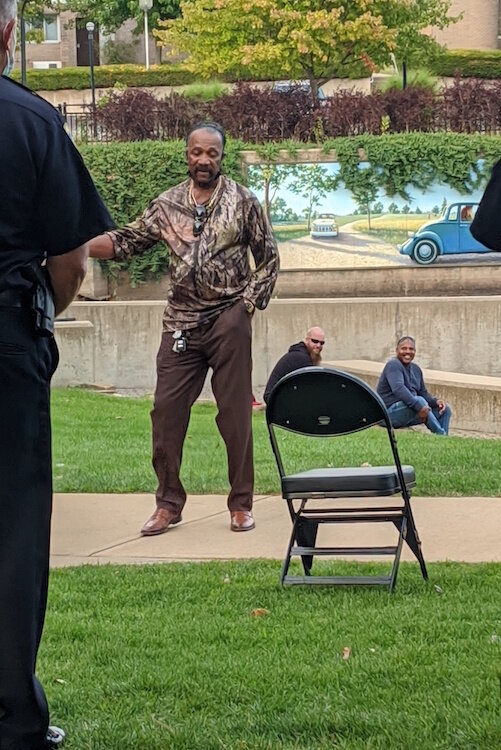
“We are at a crossroads in humanity and the only way to get through this is to come together. What I’m telling you this evening is that if we do not come together as one we are in serious danger of losing what my ancestors did for this country which is arguably the strongest (country) in the world. My ancestors’ blood is soaked into the fabric of this country,” Steiner says. “I need you and you need me and together we can bring Battle Creek into the mainstream. We’ve got some good leaders here, but they’re so consumed in trying to do so much, that very little gets done.”
From the national perspective, he says, the killing of unarmed Black people by white police officers and the lack of a vaccine for COVID-19 has put the United States under a microscope that other countries are looking through.
“We’ve got political and racial strife. The police and our country are under examination and the rest of the world looks at us with disdain,” Steiner says. “Black Lives Matter. When Black folks kill each other don’t nobody know anything, but when a White police officer kills someone, it’s on Facebook and Twitter and all over the place. We got a lot of work to do.”
“There seems not to be a lot of cooperation on the part of Black citizens when crimes are committed,” says J.R. Reynolds, a city resident, and Beyond Separation Design Team Coordinator with the W.K. Kellogg Foundation’s Truth, Racial Healing and Transformation initiative. He asked the panel what can be done to promote greater participation and support of the city’s law enforcement.
When officers respond to a crime scene, Blocker says there is significant trauma involved and they are working with facts and information available to them through dispatch calls. He says an officer in a crisis situation may have 10 or 15 people all coming at them emanating trauma and the impact of that trauma.
Blocker says evidence presented at the moment of trauma may not be the reality of the facts because of the impact that the trauma has on a victim’s ability to think and act clearly. The evidence given at the time, he says, may not be fully developed.
“On Day One of a homicide investigation, for example, we’re trying to go back and hope that some of that trauma has been decreased and that is where the community jumps in because it’s pretty rare that we have all the answers or nuances. So community support and cooperation is a requirement.”
He says officers may have an idea of who the perpetrator is, but that could be based on a perception.
“If we don’t have that level of community cooperation, it’s the victims and all who love them that suffer the most,” he says.
Nakia Baylis, Ph.D., Community Impact Associate for the United Way of the Battle Creek Kalamazoo Region and a moderator for the discussions, says, “Black folks have a complicated relationship with the criminal justice system.”
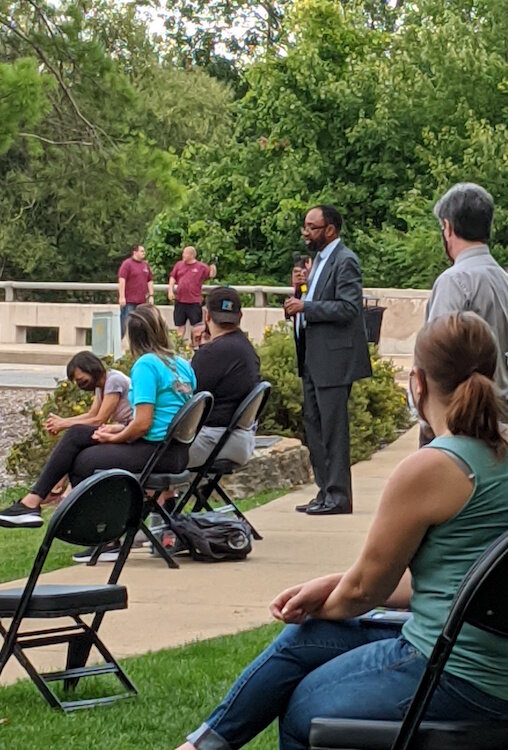
This relationship has been exacerbated by memories of previous encounters with the police, says Carey Whitfield, president of the Battle Creek Branch of the NAACP (National Association for the Advancement of Colored People). Too often, he says, throughout the United States when people have been killed by police officers an apology is offered or someone says a mistake was made, but that isn’t going to bring them back.
“The police department in Battle Creek has not always been great and they remember the history and they remember that the police have not always been nice to them,” Whitfield says. “People carry that history of when the police could physically abuse you.
“The reality is people don’t trust the police because they have reason not to. Building relationships takes time, the same amount of time it took to destroy it.”
Overall, Whitfield’s opinion of the BCPD has improved, although he says that he thinks there are still officers who won’t listen and follow policies and procedures.
“If we continue to share and make sure everyone gets the same message and the message is all lives matter and if we are all on the same page, we will have the balance we need to move forward, but I don’t want to hear anyone say ‘It was a mistake and I apologize,’” Whitfield says. “We need to change the attitude and the script.
“If the police come to your door asking for information about an incident, help them. They need to continue to change and so do we.”
Referring to herself as a “social worker at heart,” Ashley Jones, a candidate for the city commission’s Ward 2 seat, says it’s important for officers to have cultural competencies and to understand the environment they’re going into.
“It’s getting to know each other at a human level, communicating effectively, and being action-driven with what you’re doing,” she says. “It’s a basic level of communicating and meeting people where they are.”
But, the relationship between the police and the Black community may not improve until a generation has been skipped, says Keith Mathews, founder and CEO of Brilliant Minds Family Counseling in Battle Creek.
Matthews says he thinks officers need to be held accountable for their actions and need to hold each other accountable.
Blocker says this is happening and cited an incident where an officer who had been on the job for less than one month came forward to share his concerns about another officer who he thought was doing something wrong. This led to the termination of the rule-breaking officer and disciplinary action against four officers, including two who were the terminated officer’s supervisors.
“The end result was that someone did come forward,” Blocker says, adding that he gave this example because culture trumps policy all day long.
He says police departments have national accreditation standards to back up policies. But, that in any agency in the United States there are police unions that are actively blocking police chiefs from meting out discipline.
“Solving criminal cases, you need to have a relationship with the community and you almost have to jump a generation because the mistrust is so wide and hard with the current generation of Black men,” says Matthews, who also founded Cool People Community Savers in 1984 to support young people and give them a sense of belonging.
He echoed a sentiment expressed by younger members of the city’s Black community during a meeting in June with Blocker that they wanted to see more officers interacting with the city’s youth during community events or on their own.
Blocker has said and continues to reinforce that his department is doing what it can on a limited budget when it comes to community outreach.
Johnson says he wonders if there is an opportunity or interest from the BCPD in reevaluating how they spend those dollars.
“Many of us are familiar with the pre-school to prison pipeline and the reality of how drugs were planted in our community. I think of my own experiences growing up in Washington Heights without my father because he was in prison,” Johnson says. “I’ve experienced my father and three of my brothers being incarcerated at the same time. My father and youngest brother were sharing a cell at one point.
“Drugs have impacted my family for three generations. We’re dealing with the aftermath.”
Johnson suggested spending “those tax dollars at the beginning instead of at the end (on youngsters are in school instead of adults in prison). In my mind instead of producing citizens that take away from tax dollars, we need to change the trajectory and produce taxpayers.”
“We need to have more things for youth to do or they wouldn’t be out in the streets,” says Derrick Freeman, a candidate for an At-Large ward seat on the city commission. “We need to see people who look like us being in power, owning a business, and getting an education.”
Freeman says he was the first young man in his family to get college degrees – he earned four Associates degrees. “I could have been selling dope and taking road trips, but I had a mentor. We know that our young men need to be mentored,” he says. “When was the last time we picked up one of those young brothers and took them under our wing?”
Part of the focus of Monday’s gathering was to put together a list of thoughts and concerns expressed by participants. Baylis says that will be shared with Blocker and Fleury who will come back with action items and responses.
“The city will undergo an equity audit on how we spend money and what we focus on with policies and procedures,” Fleury says. “We’re taking what we heard tonight and using it for our equity audit. The equity audit will be designed to take a look at how the city’s systems work internally and how they interact externally.”
“I do feel as if this is a step in creating a safe place, to keep it real with you all, but I also want to challenge you and our community by holding you accountable for the changes you speak of today,” says Keona Ackley, candidate for the Ward 5 city commission seat.
Ackley was raised on the Washington Heights side of Columbia and is raising her children on the other side of Columbia. She says the trauma is real on both sides of that major thoroughfare.
“I’d like for us to be able to meet each other halfway,” she says, “and if we are each other’s neighbors to show that love and respect and we’ll see that change.”

